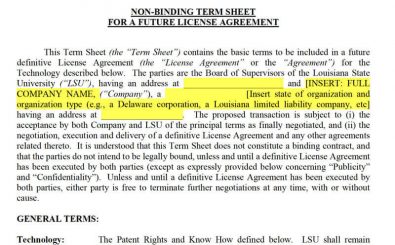Non-Binding Term Sheet Template
Non-Binding Term Sheet Template
A Non-Binding Term Sheet Template is not legally binding unless it expressly states that its parts are legally binding. Instead, it should be seen as a note outlining what has been agreed between the negotiating parties. It is often referred to as a memorandum of understanding, which it really is, but it is not a legally binding agreement.
It is designed to attract the interest of potential investors and as a guide for advisers who will be responsible for working out a final and binding deal. If a term sheet is a non-binding and therefore not legally binding agreement, why do investors demand a review?
According to Investopdia, a non-binding term sheet template is to set out the basic conditions for an investment. Once the parties have agreed on the details set out in the Bulletin, a binding contract or contract can be drawn up which corresponds to its details. Term sheets are non-binding agreements that, according to investment experts and investors, set some of the basic conditions for investing.
Non-binding term sheet template excel is a written document that the parties exchange and that contains all the important terms of the deal. The non-binding term sheet template excel summarizes the main points of a deal or agreement and regulates the differences before the legal agreement is actually implemented, starting with the actual time-consuming due diligence. It is not binding because it reflects the investments that are made, but rather a non-binding agreement.
The final agreement, drawn up by an internal or external legal team, will also be determined by a non-binding term sheet template spreadsheet and not by a binding agreement between the parties.
However, to complicate matters, the General Terms and Conditions can sometimes be legally binding, but not binding on certain clauses. For example, if one party violates a confidentiality clause by disclosing confidential information, and none of the other clauses is binding on the subject, the confidentiality clause is binding, i.e. the confidentiality clause could be binding. If any of these confidentiality clauses were binding (e.g. confidentiality clause), other parties could sue them for breach of contract. (i, e., they could sue for violation of the terms of a term sheet). However, some of them are sometimes non-binding and therefore subject to legal action by the parties.
Large companies often bring other corporations into negotiations, and if less favourable terms are agreed for one party, the other party may feel unable to negotiate. With the non-binding term sheet template spreadsheet, both parties may leave the negotiations, which means that time and money spent during the negotiation phase are lost. Should an agreement nevertheless be reached, the parties could enforce the more favourable conditions contained in the clause.
If you have a clause that both parties renegotiate in good faith, you can resign if you have simply changed your mind. Although there are exceptions to this rule, most term sheets are non-binding, the point is to set the terms before hopefully concluding a legally binding agreement. If a term sheet has a language that expressly states that it is non-binding, then it is non-binding.
In this case, the infringer would be obliged to pay them the value that they could reasonably expect if they had a final agreement on the same terms as set out in the Term Sheet. Sometimes non-binding terms and conditions are binding, sometimes not, and in both cases the terms and conditions must be agreed in good faith before conclusion of the contract (caution!). Other clauses include other conditions, such as an agreement between the parties to the sale of a property or a contract between two companies.
These rules are binding, and failure to comply with them can result in an obligation for a start-up to pay compensation to investors. This warning note deals with the SIGA case and suggests ways to mitigate the expectation of claims for damages by the court on the basis of the non-binding terms in the term sheet.
Almost all term sheets will contain striking wording stating that the term sheet is not binding, and the court would force the parties to comply with the term sheets.
Courts in many states treat a term sheet agreement as a promise to negotiate in good faith on the basis of the agreed terms of the sheet. As term sheets are primarily focused on the business aspects of a transaction, clients should consult with their attorneys before signing. In order to sign definitive agreements on key transactions, companies are often asked to sign a short document setting out the main terms and conditions of the proposed transaction.
Some clients are concerned that it is not worthwhile to have the term sheet reviewed by a lawyer, or that the involvement of lawyers would cause unnecessary friction between the parties. However, if the terms and conditions of the publication do not expressly state that the terms and conditions are non-binding, this shall not be binding on any of the parties.

